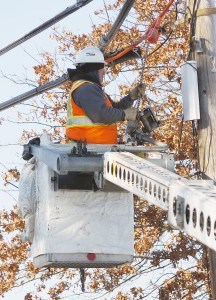Burlington city officials are mired in controversy over the legality of a recently revealed $17 million dollar unpaid loan given to Burlington Telecom, an apparent violation of the terms of its license issued by the Vermont Public Service board. While the municipally-owned fiber optic network is permitted to borrow money from the city, it must be repaid within 60 days, because the city charter insists that Burlington Telecom be an independently financed venture that does not become a taxpayer liability.
Dubbed by some as TelecomGate, it has become a major media story in Vermont’s largest city. Some taxpayers are upset by the perceived “bailout” of Burlington Telecom after the company exhausted its commercial loans of almost $34 million dollars to construct a fiber network serving homes and businesses. The Burlington Free Press has reported the city began quietly funding Burlington Telecom as early as late 2007, for both capital expenditures and some operating costs. As of today, Burlington Telecom has an accumulated debt of $50 million dollars, $17 million of which is owed to the city.
[flv]http://www.phillipdampier.com/video/WCAX Burlington Telecom Controversy 10-16-09.flv[/flv]
WCAX-TV in Burlington breaks the story about the funding controversy on October 16th. (3 minutes)
Burlington officials admit they underestimated construction costs, in part because they failed to complete a comprehensive engineering study prior to construction. Installing underground fiber cabling has literally hit a rock ledge, part of the geological character of underground Burlington, that will require an additional $10 million to cope with.
The fact the public is just finding out about it now is a major reason for the controversy. Jonathan Leopold, the city’s chief administrative officer, said he learned that the financing violated the company’s license terms last November. The Free Press reports he only informed the city council responsible for overseeing the operation in May of this year, six months later. The city council itself waited four months until late September before it notified Vermont state officials about the apparent violation, which led to the matter finally going public.
State officials publicly criticized the Burlington city government for the apparent transgression and for what some have called a cover-up, and State Auditor Thomas Salmon called on Burlington Telecom to have greater openness and transparency. State Public Service Commissioner David O’Brien called the funding irregularity a potential violation of law and that Burlington Telecom was “in debt beyond their ability to recover,” a charge which brought a hot response from Burlington mayor Bob Kiss:
“Commissioner O’Brien’s statements as quoted in today’s Burlington Free Press are inaccurate, inflammatory and totally inappropriate given there is a present proceeding before the Vermont Public Service Board in which his Department is supposed to be representing the public interest. Commissioner O’Brien knew or should have known of the City’s use of pooled cash to fund BT’s capital expenses and start up costs for almost a year. His comments only serve to undermine the confidence of BT’s customers, the interests of whom his Department is charged by statute to protect.”
O’Brien responded that Kiss was “shooting the messenger.”
[flv]http://www.phillipdampier.com/video/WCAX Burlington Burlington Telecom Scandal 10-20-09.flv[/flv]
WCAX-TV reports Burlington city council members had tough words for Jonathan Leopold at a meeting on October 20th, but Burlington mayor Bob Kiss is standing by Leopold. (3 minutes)
City council members have scurried for cover after the local press revealed they approved Burlington Telecom’s funding 13-1 at a city council meeting held October 5th. That may serve to back up Leopold’s position that he never hid any details about the loan arrangements — city officials and lawyers were well aware of these transactions, he says. Several public venting sessions were rapidly scheduled to allow constituents to express their concerns.
The Burlington Free-Press editorialized that the city can no longer keep information about city-owned Burlington Telecom’s problems and violations from residents by saying the secrets are necessary for business reasons and is calling for an independent investigation and audit.
State and local politics have also become deeply ingrained into the debate, with accusations flying between political parties that the flap has now become more about undermining the current administration than ferreting out and resolving issues with Burlington Telecom.
[flv]http://www.phillipdampier.com/video/WPTZ Plattsburgh – Taxpayers Give City Council Piece Of Their Mind 10-22-09.flv[/flv]
WPTZ-TV in Plattsburgh covered the public venting session on October 22 set up by the city council to allow residents to speak their minds. (2 minutes)
Leopold, whose administration duties involve Burlington Telecom, and who has been the most visible figure in the middle of the dispute, called attacks on him by some local politicians part of a scapegoating witch hunt.
City council voted 8-6 at 1:30am this morning approving a resolution to ask for the suspension of Jonathan Leopold anyway. So far Mayor Kiss won’t hear of it. At a press conference he reiterated his full support for Leopold, saying his suspension is “not warranted by the facts and is not in the best interests of the city. As mayor, I will not suspend the CAO from his service to the city.”
Caught in the middle is Burlington Telecom and its 4,600 subscribers. The provider is in apparent violation of its license for its loan arrangements, needs additional money to complete its buildout, and will likely also be cited for not completing that buildout on the schedule it committed to as part of its license to operate.
Commentary: Our Take
Too often municipal broadband projects end up as political footballs kicked all over town, especially when controversy erupts.
[flv]http://www.phillipdampier.com/video/WPTZ Plattsburgh State Demands Repayment 10-20-09.flv[/flv]
WPTZ-TV covers the political repercussions and damage control operations in full force after news of the controversy erupted. (10/20/2009 – 2 minutes)
Burlington Telecom made a crucial mistake when it failed to undertake a detailed engineering study to determine the true costs of wiring Burlington with fiber optics, something incumbents Comcast and FairPoint have not been willing to undertake. A true picture of the start-up costs would have resulted in a better understanding of initial construction costs and the financing required to pay for it.
City officials also erred in how they began funding some of the costs to administer the system after initial financing ran out. Good intentions or not, the fact there is a perceived cover-up makes things much more attractive to a media that often ignores or buries telecommunications stories on the business pages.
A frank and open discussion explaining the challenges and resolutions to them might have brought about temporary city loans with the consent of the community, without melodramatic political theater. Residents have a unique buy-in with Burlington Telecom because it’s municipally-owned. Many would be more than willing to see that and some additional investments pay off instead of collapsing with a complete shutdown.
[flv]http://www.phillipdampier.com/video/WCAX Burlington Mayor Defends Administration Over Telecom Issue 10-26-09.flv[/flv]
WCAX-TV covers Burlington mayor Bob Kiss who held a press conference yesterday to defend his administration’s role in Burlington Telecom (3 minutes)
When the story broke, the usual and very predictable campaign of finger-pointing, ducking for cover, and scapegoating began. This time-honored political damage control method is voter approved, if you stick your finger to the wind and see where voter sentiment seems to be blowing. That’s precisely what state Commissioner O’Brien did, only he overplayed his populist hand. This is, after all, the same commissioner who initially made excuses on behalf of FairPoint and seemed all too willing to give that company the benefit of the doubt, right up until it became politically untenable. You cannot be a credible torch-bearer in a populist mob if you helped build the castle you now seek to burn to the ground.
Mayor Kiss was correct in calling O’Brien out, not just for his convenient criticism, but for trying to win the Self-fulfilling Prophecy Award by predicting Burlington Telecom’s demise. Vermont residents should ask him where his clairvoyance was when he was publicly stating FairPoint was doing “pretty well” a year ago. O’Brien needs to be part of the solution for a change, not part of the problem.
Leopold appears to be a classic scapegoat. As he struggled to keep Burlington Telecom afloat, it is inconceivable he was cutting loan deals without the knowledge and consent of others in the city administration. The same city council now demanding his suspension seemed all too willing to go along just a few weeks ago when it voted almost unanimously with going forward. That speaks volumes. But when the media lights fire up, and angry residents start writing and calling, the complete turnaround is a site to behold. A series of self-serving, concern trolling speeches followed, along with complaints they were never given enough information or were confused by what they heard. If that is the kind of leadership Burlington has, perhaps residents need to consider making some changes.
[flv]http://www.phillipdampier.com/video/WCAX Burlington City Council Undecided About Burlington Telecom 10-26-09.flv[/flv]
Late last night, WCAX reported city council was still undecided about what to do about the Burlington Telecom controversy. (3 minutes)
The public has a right to be upset, but are all too often satisfied with the political theater designed to quickly “resolve” the problem by expelling the designated scapegoat from their midst. Mayor Kiss has remarkably withstood the usual pattern very well thus far.
While the politicians play “not my fault,” Burlington Telecom customers need answers to know if their provider is endangered. An independent audit and review, free of political know-nothings would be a start. How about bringing in those with actual expertise in deploying municipal networks. How about excluding involved, self-interest-protecting elected officials, especially those who had any hand in the FairPoint debacle.
It’s also time to fund that engineering study for the unwired portions of Burlington to get a true cost analysis. A review as to why Burlington Telecom is not attracting a larger segment of the market is also needed.
In broadband, at least, that’s a no-brainer. Burlington Telecom’s speeds on the download side are too slow and too expensive. Comcast offers faster downstream service at lower prices, so why would anyone want to switch? Burlington Telecom is trying to market their synchronous speed network (your downstream speed and upstream speed is the same), which would normally be appealing to a segment of Internet customers frustrated with cable and DSL shortchanging them on upload speeds. But the customers who understand and appreciate the difference will not accept a broadband service that tops out at 8Mbps for an enormous $71.80 a month. That’s far too slow and too expensive when Comcast is offering 12Mbps/2Mbps (upload speed with PowerBoost) for $42.95 per month. Service for 16Mbps/2Mbps is $10 more, still twenty dollars less than Burlington Telecom is charging for half the speed. Burlington Telecom can attract a larger base of broadband customers by accelerating speeds on their network beyond what Comcast provides.
Municipal broadband projects can be successful, but should be based on a true and honest appraisal of the costs, a complete understanding of the competitive landscape, a flexibility to respond to changing markets, and a good reason why they should exist in the first place. Fulfilling the needs residents want, but incumbent providers will not provide is always the best answer. Customers don’t want anemic broadband at high prices. Provide that and a municipal broadband project will fail, even without political grandstanding and finger-pointing.
[flv]http://www.phillipdampier.com/video/WPTZ Plattsburgh Kiss Refuses To Punish Leopold Over Telecom Flap 10-27-09.flv[/flv]
This morning Burlington residents learned Burlington mayor Bob Kiss was still standing behind Jonathan Leopold, despite their calls for Leopold to be suspended. (WPTZ) (2 minutes)
Below the jump, find a one hour video interview between The Burlington Free Press and city officials on the Burlington Telecom matter.
… Continue Reading
![]() Shaw Communications, western Canada’s largest cable company, has expanded its High-Speed Nitro DOCSIS 3 broadband service in British Columbia and Alberta. Offering speeds of 100Mbps downstream and 5Mbps upstream, Shaw charges customers $149 per month for the new plan, assuming you also subscribe to other Shaw services. The three latest cities to obtain upgraded service join Victoria in British Columbia, Saskatoon in Saskatchewan, and Winnipeg, Manitoba, where upgrades were unveiled earlier this year.
Shaw Communications, western Canada’s largest cable company, has expanded its High-Speed Nitro DOCSIS 3 broadband service in British Columbia and Alberta. Offering speeds of 100Mbps downstream and 5Mbps upstream, Shaw charges customers $149 per month for the new plan, assuming you also subscribe to other Shaw services. The three latest cities to obtain upgraded service join Victoria in British Columbia, Saskatoon in Saskatchewan, and Winnipeg, Manitoba, where upgrades were unveiled earlier this year.

 Subscribe
Subscribe



